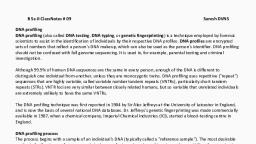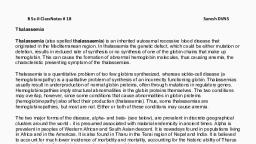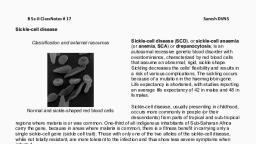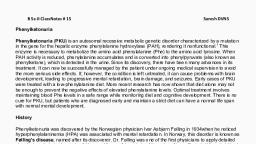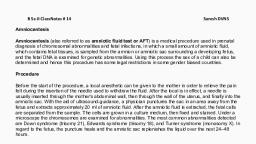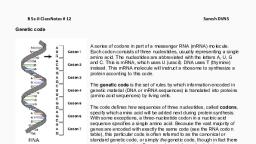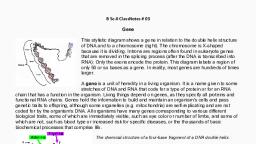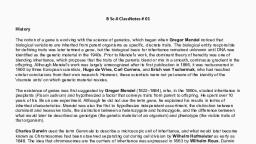Page 1 :
B Sc-II ClassNotes # 13, , Suresh DVNS, , Genetic counseling, Genetic counseling or traveling (British English) is the process by which patients or relatives, at risk of an, inherited disorder, are advised of the consequences and nature of the disorder, the probability of, developing or transmitting it, and the options open to them in management and family planning. This, complex process can be separated into diagnostic (the actual estimation of risk) and supportive aspects., Genetic counselors, The National Society of Genetic Counselors (NSGC) officially defines genetic counseling as the process of, helping people understand and adapt to the medical, psychological and familial implications of genetic, contributions to disease. This process integrates:, , , , , Interpretation of family and medical histories to assess the chance of disease occurrence or, recurrence., Education about inheritance, testing, management, prevention, resources and research., Counseling to promote informed choices and adaptation to the risk or condition., , A genetic counselor is an expert with a Master of Science degree in genetic counseling. In the United, States they are certified by the American Board of Genetic Counseling. Most enter the field from a variety of, disciplines, including biology, genetics, nursing, psychology, public health and social work. Genetic, counselors should be expert educators, skilled in translating the complex language of genomic medicine, into terms that are easy to understand., Genetic counselors work as members of a health care team and act as a patient advocate as well as a, genetic resource to physicians. Genetic counselors provide information and support to families who have, members with birth defects or genetic disorders, and to families who may be at risk for a variety of inherited, conditions. They identify families at risk, investigate the problems present in the family, interpret information, about the disorder, analyze inheritance patterns and risks of recurrence, and review available genetic, testing options with the family., Genetic counselors are present at high risk or specialty prenatal clinics that offer prenatal diagnosis,, pediatric care centers, and adult genetic centers. Genetic counseling can occur before conception (i.e., when one or two of the parents are carriers of a certain trait) through to adulthood (for adult onset genetic, conditions, such as Huntington's disease or hereditary cancer syndromes)., Patients, Any person may seek out genetic counseling for a condition they may have inherited from their biological, parents., A woman, if pregnant, may be referred for genetic counseling if a risk is discovered through prenatal testing, (screening or diagnosis). Some clients are notified of having a higher individual risk for chromosomal, abnormalities or birth defects. Testing enables women and couples to make a decision as to whether or not, to continue with their pregnancy, and helps provide information that can be used to prepare for the birth of a, child with medical issues., A person may also undergo genetic counseling after the birth of a child with a genetic condition. In these, instances, the genetic counselor explains the condition to the patient along with recurrence risks in future, children. In all cases of a positive family history for a condition, the genetic counselor can evaluate risks,, recurrence and explain the condition itself., Counseling session structure
Page 2 :
B Sc-II ClassNotes # 13, , Suresh DVNS, , The goals of genetic counseling are to increase understanding of genetic diseases, discuss disease, management options, and explain the risks and benefits of testing. Counseling sessions focus on giving, vital, unbiased information and non-directive assistance in the patient's decision making process. Seymour, Kessler, in 1979, first categorized sessions in five phases: an intake phase, an initial contact phase, the, encounter phase, the summary phase, and a follow-up phase. The intake and follow-up phases occur, outside of the actual counseling session. The initial contact phase is when the counselor and families meet, and build rapport. The encounter phase includes dialogue between the counselor and the client about the, nature of screening and diagnostic tests. The summary phase provides all the options and decisions, available for the next step. If counselees wish to go ahead with testing, an appointment is organized and, the genetic counselor acts as the person to communicate the results., Reasons and results, Families or individuals may choose to attend counseling or undergo prenatal testing for a number of, reasons., , , , , , , , , Family history of a chromosome abnormality, Molecular test for single gene disorder, Increased maternal age (>35 years), Abnormal serum screening results or ultrasound findings, Increased nuchal translucency, Strong family history of cancer, Predictive testing for adult-onset conditions, , Detectable conditions, Most disorders cannot occur unless both the mother and father pass on their genes, such as Cystic, Fibrosis. Some diseases can be inherited from one parent, such as Huntington’s disease. Other genetic, disorders are the cause of an error or mutation occurring during the cell division process (trisomy). Testing, can reveal conditions that are easily treatable as long as they are detected (Phenylketonuria or PKU)., Results from genetic testing may also reveal:, , , , , , , , Down syndrome, Sickle-cell anemia, Tay-Sachs disease, Spina bifida, Muscular dystrophy, Mental retardation, , Genetic counselors as support, Genetic Alliance states that counselors provide supportive counseling to families, serve as patient, advocates and refer individuals and families to community or state support services. They serve as, educators and resource people for other health care professionals and for the general public. Many engage, in research activities related to the field of medical genetics and genetic counseling. The field of genetic, counseling is rapidly expanding and many counselors are taking on "non-traditional roles" which includes, working for genetic companies and laboratories.] When communicating increased risk, counselors, anticipate the likely distress and prepare patients for the results. Counselors help clients cope with the, emotional, psychological, medical, social, and economic consequences of the test results., Each individual considers their family needs, social setting, cultural background, and religious beliefs when, interpreting their risk. Clients must evaluate their reasoning to continue with testing at all. Counselors are, present to put all the possibilities in perspective and encourage clients to take time to think about their, decision. When a risk is found, counselors frequently reassure parents that they were not responsible for
Page 3 :
B Sc-II ClassNotes # 13, , Suresh DVNS, , the result. An informed choice without pressure or coercion is made when all relevant information has been, given and understood., Prenatal genetic counseling, If an initial noninvasive screening test reveals a risk to the fetus, clients are encouraged to attend genetic, counseling to learn about their options. Further prenatal investigation is beneficial and provides helpful, details regarding the status of the fetus, contributing to the decision-making process. Decisions made by, clients are affected by factors including timing, accuracy of information provided by tests, and risk and, benefits of the tests. Counselors present a summary of all the options available. Clients may accept the risk, and have no future testing, proceed to diagnostic testing, or take further screening tests to refine the risk., Invasive diagnostic tests possess a small risk of miscarriage (1-2%) but provide more definitive results., Increased risk result is commonly presented in positively and negatively ways. While families seek direction, and suggestions from the counselors, they are reassured that no right or wrong answer exists. When, discussing possible choices, counselor discourse predominates and is characterized by examples of what, some people might do. Discussion enables people to place the information and circumstances into the, context of their own lives. Clients are given a decision-making framework they can use to situate, themselves. The outcomes of tests may reveal normal results but chromosomal anomaly and fetal death, are possibilities. Counselors focus on the importance of individual choice and do not encourage deliberation, during their informative sessions. Testing is offered because some diagnosed conditions cannot be, changed in any way and there is no therapy or treatment available to make it better. Therefore, parents, must decide how they should proceed in their pregnancy after learning that their fetus has a potential, condition., Referral, After attending counseling, women have the option of accepting the risk revealed and having no further, treatment during their pregnancy. They may choose to undergo noninvasive screening (Triple screen) or, invasive diagnostic testing (Amniocentesis or Chorionic villus sampling)., Attitudes toward counseling, The general public lack adequate knowledge of screening and diagnostic tests and their consequences., The plethora of information available can be overwhelming and counselors spend a large proportion of time, clarifying details. Prenatal screening was first introduced nearly four decades ago, yet gaps still exist in, public knowledge about the screening program. The general public is familiar with Down syndrome (trisomy, 21), but is not aware of more uncommon conditions such as Edwards’ syndrome (trisomy 18) and Patau, syndrome (trisomy 13). Clients are usually aware of diagnostic testing from friends, TV/press, or because of, family history., No simple correlation has been found between the change in technology to the changes in values and, beliefs towards genetic testing. Some think that genetic testing is a great advance while others think it will, cause trouble. Despite lack of adequate knowledge, Kitsiou-Tzeli et al. found that most Greek women are, satisfied with the information they receive and are willing to undergo testing if they are pregnant again.



